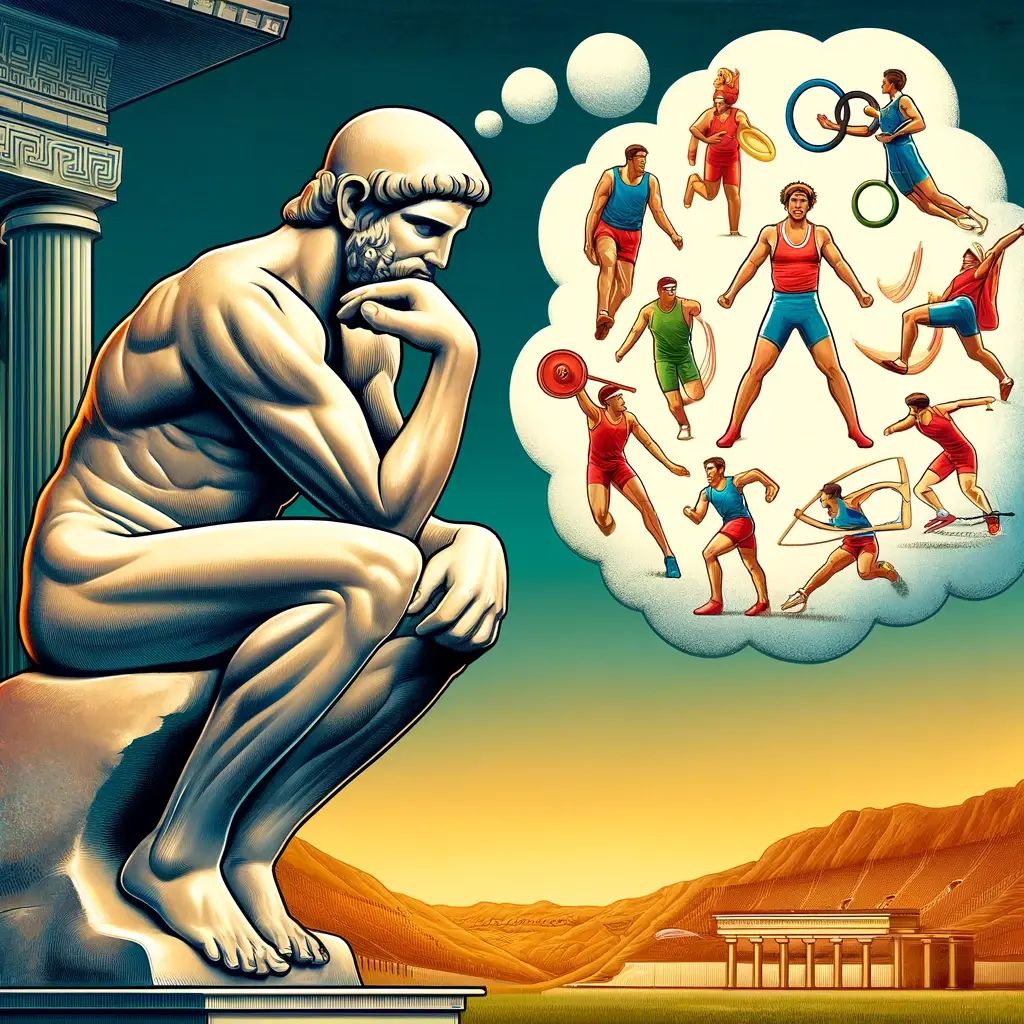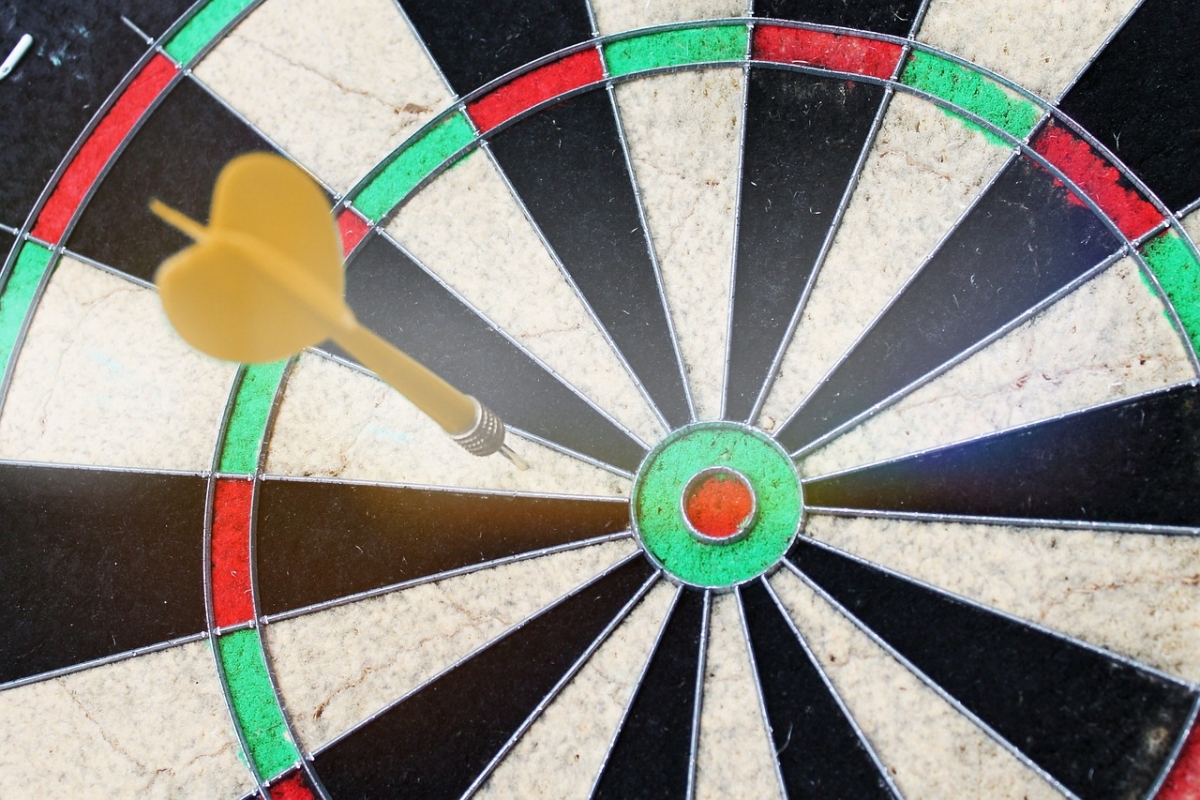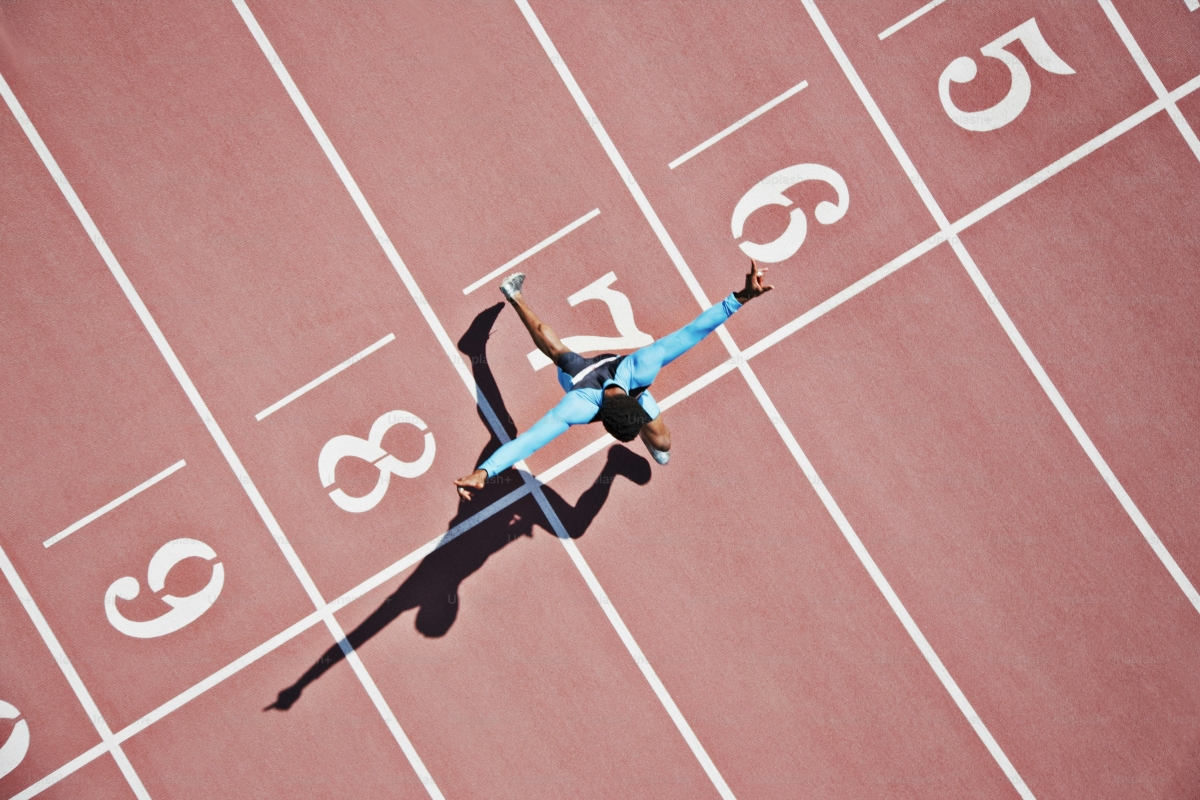Essential psychological aspects of the Olympic Mind
Editor: Elisa Bisagno
Editorial Assistant: Stephanie Davey, Jakob Kaiser
This article has also been translated into Dutch.
It is a common
myth that perfection and ‘rising above yourself’ are required to clinch Olympic gold. Very rarely, however, do athletes realize a perfect race or match. If athletes nonetheless focus solely on this inspiring but virtually unattainable
goal, they may underachieve in the big moments. From a psychological perspective, peak performance is also about controlling the controllables, acceptance, composure, focus on the task at hand, limiting performance losses, and being prepared for setbacks.
 Image 1: Greek goddess thinking about the Olympic Games.
Image 1: Greek goddess thinking about the Olympic Games.
Pierre de Coubertin, known as the father of the modern Olympic Games, espoused the view that participation is more important than winning. This romanticized vision is at odds with the achievement goals most athletes pursue in competitive contexts, including the Paris 2024 Olympic Games. Sports are typically zero-sum games (i.e., the outcome is either win or lose), which almost automatically enforces a winning is all mentality. Accordingly, in competitive contexts, ‘winning’ is the most important achievement goal for most athletes [1]. More generally, when evaluating their performances, individuals primarily consider how they did relative to others [2]. Obviously, winners then feel much better than those who were outplayed by their opponents, which in turn reinforces their goal to win.
Paradoxically, a focus on ‘winning’ may interfere with the extraordinary performance Olympic athletes need to deliver in the defining moments [1]. The problem with a primary focus on results, scores, or outcomes is that athletes largely lack control over the outcomes of competitions. At the Paris 2024 Olympic Games, athletes or teams may perform to the best of their ability but nevertheless lose because their opponents, who are also extremely talented and skilled, perform even better. The reality is that only a handful of the more than 10,000 participants will return home with a medal. If athletes focus on largely uncontrollable outcomes during their sports performances, they are distracted from the task at hand. Such distracting thoughts (e.g., I am not good enough to win this; I always mess up at the crucial moment; My Olympic dream is falling to pieces) undermine performance in any sport, but particularly in sports that require intense focus, concentration, and precision.
This does not imply that athletes should neglect their goal to win. In contrast, the desire to win energizes and directs, and inspires and motivates, especially elite athletes. But this motivational force should be used at the right time: in training sessions, for example, when athletes learn to deal with adversity and tough conditions (rain, cold, pain), when they prepare for important matches, or when they have to give their all to get the maximum out of it. During the actual race, match, or competition, however, athletes should focus on personally controllable, task-relevant building blocks of their goal to win [3], [4].
Personally controllable task-based goals
Task-based goals refer to how athletes can achieve their ultimate but largely uncontrollable outcome goal. Task-based goals are set by breaking the outcome goal (e.g., ‘winning’) down into personally controllable and manageable chunks. Because task-based goals rely on standards that are inherent in the task itself, athletes receive direct and ongoing feedback during their sports performances [5]. This process enhances concentration, commitment, and enjoyment. For example, at the Paris 2024 Olympic Games, swimmers may focus on their start speed (15 m from signal), turn speed, finishing speed (last 5 m), swimming speed per lap, and stroke frequency and stroke length. Achieving the task-based goals likely results – if realistically set – in reaching the desired outcome (e.g., the next round, a spot in the final, a medal).
By implication, athletes should judge themselves primarily on the basis of their task-based goals, regardless of the outcome [6]. Did I give it my all out in the arena? Did I control the controllables? Did I execute my tasks to the best of my ability? If they did, but nevertheless failed to attain their desired outcome goal, this usually leads to mixed feelings, though. For example, when reflecting on her performance at the World Aquatics Championships 2017, Dutch triple Olympic champion Ranomi Kromowidjojo said: “At the London 2012 Olympic Games I managed to secure a gold medal. It wasn’t my best race ever ….. Now I performed to the best of my ability, but I am disappointed not to finish on the podium.” Arguably, immediately after a defeat, feelings of frustration and disappointment prevail in athletes like Ranomi. But a couple of hours or days later, athletes who lost but achieved their task-based goals may have a more realistic and positive view of their performance.
In any case, an essential psychological aspect of the Olympic mind is the ability “to make the best use of what is in your power, and to take the rest as it happens”. However, following this advice of Epictetus, an ancient Greek Stoic philosopher, is easier said than done. First of all, it is not always clear what is in your control as an individual. The Serenity Prayer, therefore, asks for “…. the serenity to accept the things I cannot change, the courage to change the things I can, and the wisdom to know the difference.
Second, athletes may focus on task-relevant things they should not do. Examples of avoidance goals are: Do not hit the ball too short, do not sway, do not be anxious. But if you do not want something, if you are trying to avoid something, what do you focus on? You then are running around like a chicken with its head cut off. If athletes have an avoidance goal in their minds, which is quite normal, they should replace it with a more effective approach goal [7], [8]. That kind of goal specifies what athletes should do: for example, hit the ball against the back line, aim left into the corner, or show guts. And then, if an athlete has achieved his approach goal (e.g., he has shot the ball into the top right corner), he can simultaneously tick off his avoidance goal (he has not shot the ball wide of the goal).
Third, a focus on the personally controllable aspects of the task at hand requires self-control: the capacity to regulate attention, emotion, and behavior in the presence of temptation [9]. For example, in a competitive context, athletes may be tempted to adopt an opponent’s pace rather than trusting their own optimum pace of racing or playing. Or they might feel the urge to do ‘something special’ while lacking the required competence or consistency.
Do what you can; do not expect to rise above yourself
Self-control helps athletes to refrain from attempting to do the impossible in the big moments in order to obtain a special outcome (e.g., an Olympic medal). “Thriving under pressure is a falsehood” [10, p.25]. The best athletes can do is reach their current performance level: that is, the maximum they are capable of at that specific point in time (based on actual training metrics, biometric data, performance tests, etc.). As Weisinger and Pawliw-Fry put it: “The best you can do is your best – you can’t do magically better than you have done before” [10, p.30] Particularly in the big moments, leaks in athletes’ potential performance, or performance losses, are likely to occur due to nerves, distractions, or fear of failure [3]. For example, by analyzing free throw shooting under varying conditions of pressure, researchers concluded that NBA basketball players, including star players such as Michael Jordan, performed worse under high pressure conditions. Similarly, no evidence was found that there were hitters in baseball who consistently hit better in the high-pressure moments of the game [10], [11]. Hence, another crucial psychological aspect of the Olympic mind is the ability to achieve one’s own current performance level (physical, technical, tactical, mental). That is, do what you can, go all the way, and get the most out of yourself. But don't expect to rise above yourself; that is an unattainable goal that does more harm than good [12,13]. Athletes who are able to reduce performance loss to zero, perform to the best of their ability [13].
Prepare for adversity and the unexpected
Olympians dream of the perfect race, jump, or game at the Paris 2024 Olympic Games. They may even feel that perfection, or at least performing without performance losses, is a conditio sine qua non to secure an Olympic medal [14]. However, the number of Olympic champions that have won their gold medals without a small mistake, a slight balance disturbance, a little hesitation, or a minor adaptation, is negligible. At the 2022 Winter Olympics in Beijing, for example, the most decorated Olympic speed skater of all time, Ireen Wüst, became the first athlete ever to win an individual gold medal at five (consecutive) Olympics, Summer or Winter. This unique accomplishment sets her apart from other greats such as Michael Phelps and Usain Bolt. Still, after winning the 1500-meter race and setting a new Olympic record in Beijing, she revealed: “I have yet to skate the perfect race."
 Image 3 Winning gold by executing an imperfect race (albeit sometimes close to perfection) is quite common. No matter how good the race is, even if a world record is broken, it is never perfect. World records continue to be broken in all sports. Better never stops, which is by definition not the case with perfection. Allen Johnson, American former hurdling athlete and winner of the gold medal in the 110 meter hurdles at the 1996 Atlanta Olympic Games, said: “Very rarely do you have a perfect race, and it's about overcoming your mistakes in the race and remaining composed”.
Image 3 Winning gold by executing an imperfect race (albeit sometimes close to perfection) is quite common. No matter how good the race is, even if a world record is broken, it is never perfect. World records continue to be broken in all sports. Better never stops, which is by definition not the case with perfection. Allen Johnson, American former hurdling athlete and winner of the gold medal in the 110 meter hurdles at the 1996 Atlanta Olympic Games, said: “Very rarely do you have a perfect race, and it's about overcoming your mistakes in the race and remaining composed”.
Particularly for Olympians, the pursuit of perfection inspires. It is important for them to believe that they are going to perform the incredible, the unimaginable, the impossible. Those who can visualize their perfect race increase the likelihood that they will actually execute their (close to) perfect race. If this is athletes’ sole focus, however, there is a significant likelihood that they will ultimately underachieve. After all, (little) things inevitably go wrong, circumstances often change in unpredictable ways, scenarios unfold in ways you never thought possible. If athletes are not mentally prepared for this, they might give up at the first setback or unexpected event. It is, therefore, wise to develop scenarios in advance for what to do if a small mistake is made, if a tactical plan does not work, or if the physical pain is more intense than expected. The prepared scenarios will help athletes respond calmly, flexibly, and resiliently, and accordingly, prevent further performance losses.
Acceptance–Commitment Training (ACT) [15] can help athletes overcome their mistakes by connecting fully with the present moment. ACT is geared toward athletes who want to learn to accept mistakes and negative thoughts. Furthermore, athletes learn to deal with external distractors such as weather conditions, the click of a camera, or actions by opponents. In short, ACT reinforces the idea that the natural ebb and flow of positive and negative thoughts, emotions, external factors, and bodily sensations should be experienced without judgment or avoidance. Such a mindset makes it easier to (re)focus on the task at hand.
In sum, the likelihood of optimal performance at the 2024 Paris Olympics is greater if Olympians (1) focus on personally controllable, task-relevant building blocks of the goal to win, (2) do what they can and give their all without pursuing the unattainable goal of ‘rising above’ themselves, and (3) are inspired by perfection, but also prepare for setbacks and the unexpected. These ingredients of the Olympic mind increase control over actions, means, and (sub)goals. Such an Olympic mind also enhances Olympians’ well-being in the preparation phase, enjoyment during the Olympic Games, and acceptance of end results over which they have little or no control. Strengthening and developing personal control over goal attainment, as well as accepting the uncontrollables, ultimately increase the likelihood of securing the desired outcome: an Olympic medal, preferably gold.
Bibliography
[1] N.W. Van Yperen, “In the context of a sports match, the goal to win is most important, right? Suggestive evidence for a hierarchical achievement goal system,” Psychol. Sport. Exerc., vol. 60, 102134, May 2022, doi: 10.1016/j.psychsport.2022.102134.
[2] N. W. Van Yperen and N. P. Leander, “The Overpowering Effect of Social Comparison Information (TOESCI): On the misalignment between mastery-based goals and self-evaluation criteria”, Pers. Soc. Psychol. Bull., vol. 40, no. 50, pp. 676–688, May 2014, doi: 10.1177/0146167214523475.
[3] N. W. Van Yperen, “Achievement goals and self-regulation in the sport context,” in Social Psychology: Handbook of Basic Principles, 3rd ed., P. A. M. Van Lange, E. T. Higgins and A. W. Kruglanski, Eds., New York, NY, USA: Guilford, 2021, pp. 589-606.
[4] L. Hardy, M. Barlow, L. Evans, T. Rees, T. Woodman, and C. Warr, “The Great British Medalists Project: Psychosocial biographies of super-elite and elite athletes from Olympic sports,” Prog. Brain. Res., vol. 232, pp. 1-119, 2017, doi: 10.1016/bs.pbr.2017.03.004.
[5] A. J. Elliot, K. Murayama, and R. Pekrun, “A 3 × 2 achievement goal model,” J. Educ. Psychol, vol. 103, no. 3, pp. 632–648, 2011, doi: 10.1037/a0023952.
[6] R. Holiday, The obstacle is the way: The ancient art of turning adversity to advantage, London, U.K.: Profile Books LTD, 2015.
[7] N. W. Van Yperen, M. Blaga, and T. Postmes, “A meta-analysis of self-reported achievement goals and nonself-report performance across three achievement domains (work, sports, and education),” PLoS One, vol. 9, no. 4, e93594, Apr. 2014, doi: 10.1371/journal.pone.0093594.
[8] N. W. Van Yperen, M. Blaga, and T. Postmes, “A meta-analysis of the impact of situationally induced achievement goals on task performance,” Hum. Perform., vol. 28, no. 2, pp. 165-182, 2015, doi: 10.1080/08959285.2015.1006772.
[9] R. F. Baumeister, B. J. Schmeister, and K. D. Vohs, “Self-regulation and the executive function: The self as controlling agent,” in Social psychology: Handbook of basic principles, 2nd ed., A. W. Kruglanski and E. T. Higgins Eds., New York, NY, USA: Guilford, 2007, pp. 516–53.
[10] H. Weisinger and J. P. Pawliw-Fryn, Performing under pressure: The science of doing your best when it matters most, New York, NY, USA: Crown Business, 2015.
[11] D. A. Worthy, A. B. Markman, and W. T. Maddox, “Choking and excelling at the free throw line,” The International Journal of Creativity and Problem Solving, vol. 19, no. 1, pp. 53-58, 2009.
[12] Y. H. Jeong, L. C. Healy, and D. McEwan, “The application of Goal Setting Theory to goal setting interventions in sport: A systematic review,” Int. Rev. Sport Exer. P., vol. 16, pp. 474-499, 2023, doi: 10.1080/1750984X.2021.1901298.
[13] I. D. Steiner, Group process and productivity, New York, NY, USA: Academic Press, 1972.
[14] A. P. Hill, S. H. Mallinson‐Howard, D. J. Madigan, and G. E Jowett, “Perfectionism in Sport, Dance, and Exercise: An Extended Review and Reanalysis,” in Handbook of Sport Psychology, 4th ed., vol. 1, G. Tenenbaum and R. C. Eklund, Eds., John Wiley, 2020, pp. 121-157.
[15] K. Henriksen, J. Hansen, and C. H. Larsen, Mindfulness and acceptance in sport: How to help athletes perform and thrive under pressure, Routledge: Taylor & Francis Group, 2020.
Images
Image 1: Created using DALL-E, an AI image generation tool by OpenAI.
Image 2: https://www.pexels.com/de-de/foto/person-die-gelbe-badekappe-am-schwimmbad-tragt-73760/
Image 3: https://pixabay.com/nl/photos/dartbord-darten-doel-boord-sport-5518056/
Image 4: https://www.istockphoto.com/nl/signature/foto/runner-crossing-finishing-line-on-track-gm102283878-24406869



